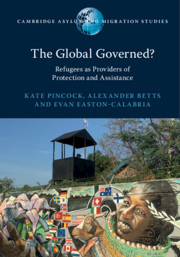3 - Kampala
Published online by Cambridge University Press: 06 March 2020
Summary
In Kampala, the institutional context can be characterised as a ‘monopoly’. Interaid has been the exclusive implementing partner (IP) of UNHCR for over two decades. Despite questions being raised over its performance and relevance, its mandate has rarely been questioned by UNHCR. Some international organisations (IOs) offer capacity-building for refugee-led organisations (RCOs), but outside of this, RCOs receive almost no recognition, resources or collaboration. The response of refugee leaders in the face of organisational monopoly is ‘activism’. This chapter describes different forms of engagement of RCOs in Kampala with institutional structures, ranging from a youth-led artistic organisation’s work with Interaid to the Refugee Led Organisations Network (RELON), launched as a network for Kampala’s organisations, with over 20 organisations represented. We found that despite the limited relationship with IOs, RCOs are active across the Congolese, Somali and South Sudanese communities. Estimates by refugees themselves on the numbers of formal RCOs in Kampala vary from around 25 to over 100 in 2018, not including unregistered organisations and associations. But even interactions of the most successful organisations with formal humanitarian governance is limited and they have instead established parallel coordination structures to both implement services and seek recognition as organisations.
- Type
- Chapter
- Information
- The Global Governed?Refugees as Providers of Protection and Assistance, pp. 31 - 52Publisher: Cambridge University PressPrint publication year: 2020



